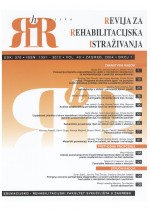Psihosocijalna onkologija
Psychosocial oncology
Author(s): Miroslav Prstačić, Damir Eljuga, Antonija Matijević, Branko Nikolić, Mladen Ćepulić, Jasminka Stepan-GiljevićSubject(s): Social psychology and group interaction, Health and medicine and law
Published by: Sveučilište u Zagrebu, Edukacijsko-rehabilitacijski fakultet
Keywords: psychosocial oncology; malignant diseases; motoric disturbances and chronic diseases; complementary supportive programs; education; therapy; rehabilitation;
Summary/Abstract: Some aspects of the development of an interdisciplinary field of psychosocial oncology within the discipline of motor disorders and chronic diseases at the Faculty of Education and Rehabilitation Sciences, University of Zagreb, have been presented. The authors state that, in the light of epidemiological indicators, the quantity of various diseases in the overall population is actually concealed and becomes more alarming in time. This is one of the reasons why interventions in the treatment of most of those chronic diseases are reduced to palliation, in which more importance is attached to collaboration of medical and paramedical experts. One of such problem fields are malignant diseases in children and adults. In that respect, an overview of some research projects has been given, i.e. the projects that were carried out in paediatric and adult oncology and at the Department for Motor Disorders and Chronic Diseases in collaboration with other clinics and departments in Croatian and abroad in the last 20-odd years. The projects were supported by the Ministry of Science and Technology and the Ministry of Health of the Republic of Croatia, as well as by the Croatian Society for Psychosocial Oncology. The analysis of changes for the defined variables in the clinical treatment has been carried out by the INDIFF method. Within a case study, the trends of changes for the defined variables have been presented also in a controlled biological substrate (a diffirential blood test and immunoglobulin classes), as well as on the basis of observed variables on cognitive and psychosocial changes under the influence of supportive therapies. The importance of previous research projects in the field of rehabilitation of malignant neoplasm patients has been presented in correlation with the development of concepts of application of the applied complementary supportive methods in other fields as well (such as eating disorders). Psychosocial oncology has been considered within the context of development of the philosophy of the discipline, the development of its professional identity in a broad.field of education and rehabilitation sciences
Journal: Hrvatska revija za rehabilitacijska istrazivanja
- Issue Year: 39/2004
- Issue No: 1
- Page Range: 77-90
- Page Count: 14
- Language: Croatian

